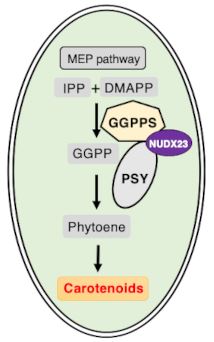A new player in carotenoid production
Rao et al. discover a new regulator to control carotenoid synthesis in plants.
https://doi.org/10.1093/plcell/koae030
By Sombir Rao and Li Li
Robert W. Holley Center for Agriculture and Health, USDA-ARS, Cornell University, Ithaca, New York 14853, USA
Plant Breeding and Genetics Section, School of Integrative Plant Science, Cornell University, Ithaca, New York 14853, USA
Background: Carotenoids are a group of pigments essential for photosynthesis and photoprotection Plants have developed various strategies to control carotenoid biosynthesis to meet their need for optimal photosynthesis and growth. Phytoene synthase (PSY) is the most important enzyme for carotenoid biosynthesis as its activity controls how much carotenoids a plant tissue can produce. Geranylgeranyl diphosphate synthase (GGPPS) catalyzes the formation of precursor, which is used to produce not only carotenoids but also various other compounds like chlorophylls. The direct contact of PSY and GGPPS to form an enzyme complex facilitates channeling of the precursor into carotenoid biosynthesis. However, not much is known about the elements that control these enzyme activities and particularly the enzyme complex assembly. A ubiquitous protein in plants, Nudix hydrolase 23 (NUDX23), is critical for carotenoid production.
Question: What proteins modulate carotenoid production in plants and how?
 Findings: NUDX23 was identified as a posttranslational regulator for carotenoid production in plants. Its expression level directly affects carotenoid content in the model plant Arabidopsis thaliana. NUDX23 was found to physically interact with PSY and GGPPS. Such interactions enable NUDX23 to recruit and stabilize PSY and GGPPS in an enzyme complex. Moreover, NUDX23 participates in and is required for the enzyme complex assembly. The functions of NUDX23 in stabilizing PSY and GGPPS and enabling them to form metabolons promote effective carotenoid production.
Findings: NUDX23 was identified as a posttranslational regulator for carotenoid production in plants. Its expression level directly affects carotenoid content in the model plant Arabidopsis thaliana. NUDX23 was found to physically interact with PSY and GGPPS. Such interactions enable NUDX23 to recruit and stabilize PSY and GGPPS in an enzyme complex. Moreover, NUDX23 participates in and is required for the enzyme complex assembly. The functions of NUDX23 in stabilizing PSY and GGPPS and enabling them to form metabolons promote effective carotenoid production.
Next steps: Plant foods with low levels of carotenoids contribute to the global prevalence of vitamin A deficiency and affect public health. Our work demonstrates that NUDX23 is an effective regulator of carotenoid production in the model plant Arabidopsis. Since NUDX23 is highly conserved in all plant species, we are interested in exploring its potential for the development of carotenoid-enriched food crops through either traditional plant breeding or biotechnology approaches.
Reference:
Sombir Rao, Hongbo Cao, Franz Joseph O’Hanna, Xuesong Zhou, Andy Lui, Emalee Wrightstone, Tara Fish, Yong Yang, Theodore Thannhauser, Lailiang Cheng, Natalia Dudareva, Li Li. (2024). Nudix hydrolase 23 post-translationally regulates carotenoid biosynthesis in plants. https://doi.org/10.1093/plcell/koae030



